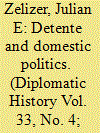| Srl | Item |
| 1 |
ID:
096605


|
|
|
| 2 |
ID:
090662


|
|
|
|
|
| Publication |
2009.
|
| Summary/Abstract |
During the first half of the 1970s, Presidents Richard Nixon and Gerald Ford responded to the aftermath of Vietnam by avoiding the extremes of the era: massive military retrenchment (left) and massive military escalation (right). The presidents had different reasons for seeking a centrist national security agenda. The Republican presidents were willing to accept and actively pursue arms and trade agreements with the Soviet Union and China. Nixon concluded that appealing to moderates was essential in order to protect a muscular national security state from retrenchment in the aftermath of the 1960s and to ensure his own electoral success. His successor, Gerald Ford, believed that détente with the Soviets could rebuild public confidence in the post-Watergate GOP.
|
|
|
|
|
|
|
|
|
|
|
|
|
|
|
|
| 3 |
ID:
126323


|
|
|
|
|
| Publication |
2013.
|
| Summary/Abstract |
President Barack Obama's two signature first-term legislative victories-the Affordable Care Act and the Dodd-Frank Act-are the law of the land, but the political battle over their entrenchment continues. The question now is whether these landmark reforms will be consolidated and create a new politics going forward. We develop an argument about the limits of policy feedback to illuminate the obstacles to durable liberal reform in the contemporary American state. We argue that political scientists have paid insufficient attention to the fragility of inherited policy commitments, and that the capacity of reforms to remake politics is contingent, conditional, and contested. Feedbacks are shaped not only by the internal attributes of policies, but also by the interaction between policy-specific characteristics, the strategic goals of officeholders and clientele groups, and the political forces arising from a contentious and uncertain political environment.
|
|
|
|
|
|
|
|
|
|
|
|
|
|
|
|